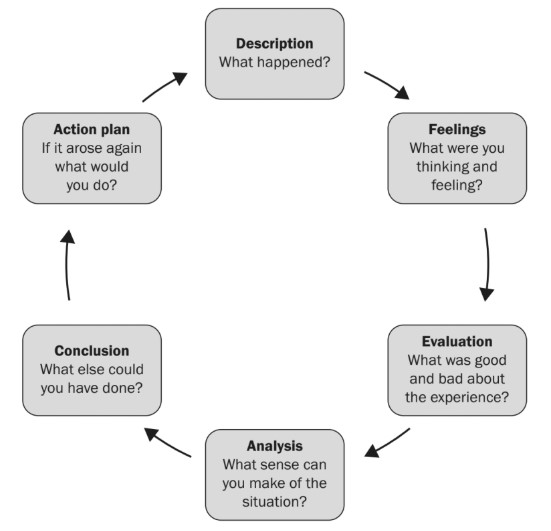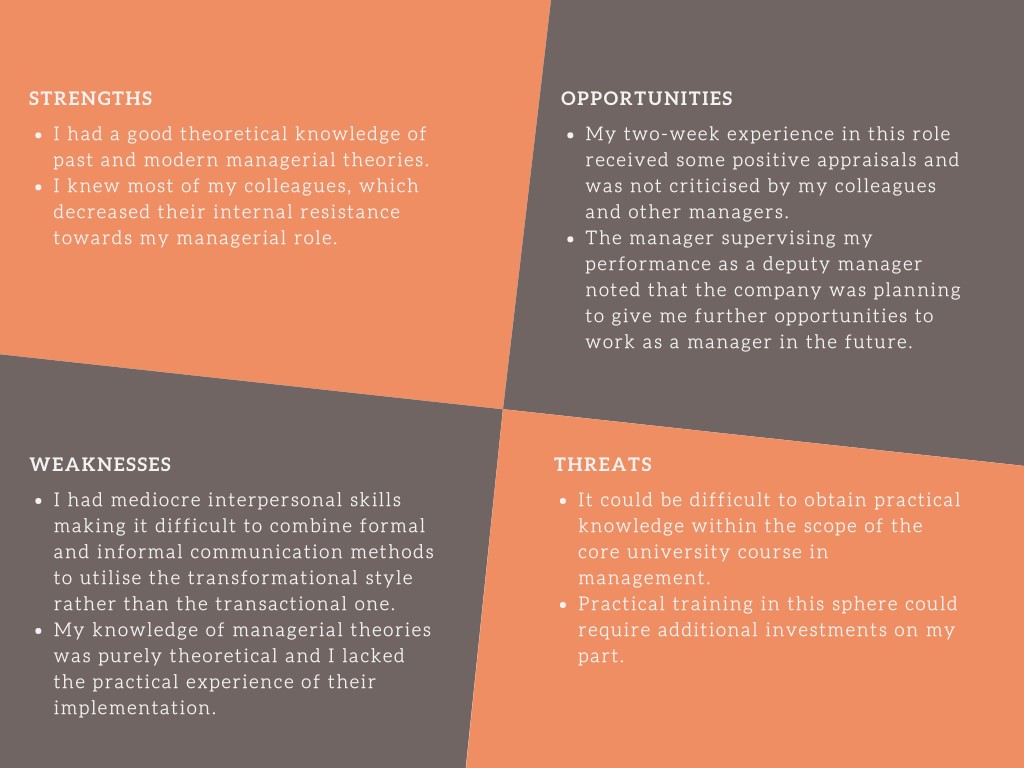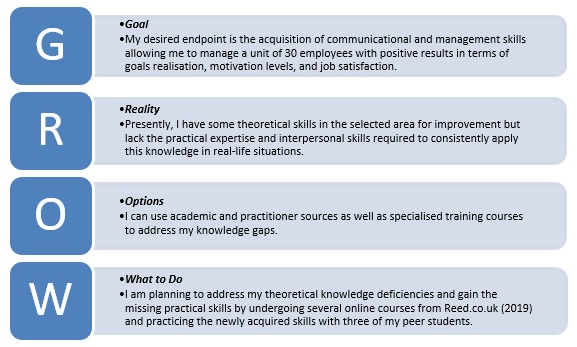Written by Philip S.
This personal reflection report provides an overview of my personal growth problems as a fifth-year MSc student studying management and a part-time specialist with managerial functions.
The reflective cycle model by Gibbs (1988) allows the users to systematise their past experiences, emotions, and findings in the manner supporting future learning and development. It includes six consecutive phases that I will use to explore the selected issue more in-depth in the following sub-sections.
Figure 1: Gibbs’ Reflective Cycle
Source: Bottomley et al. (2019, p.23)
2.1. Description
At the beginning of this year, I encountered several problems while working at my part-time job. I was asked to fill in for a department manager for two weeks after the Christmas period. Unfortunately, it turned out that some of my skills were clearly insufficient for performing this kind of obligations full-time. First, I found it difficult to motivate my colleagues and create viable incentives for realising short- and medium-term goals. Second, I did not possess the knowledge and skills required for new employee recruitment and contract termination. Finally, I felt that my suggestions and orders did not sound convincing and I lacked the sense of personal authority when dealing with workplace issues.
2.2. Feelings
Before and during these two weeks, I experienced a growing sense of anxiety and concern. At the cognitive level, I understood that I was not a fully qualified manager and had to overcome a number of failures to learn my strong and weak points. However, I also felt that the failure to meet my personal standards regarding this role was decreasing my self-confidence and could undermine the trust of my colleagues. After this period of performing the deputy functions, I could sense these feelings getting even stronger as I also experienced guilt and uneasiness for my underperformance even though nobody criticised my actions and decisions.
2.3. Evaluation
The thorough study of my mistakes performed afterwards suggested a number of key deficiencies that prevented me from being a successful deputy manager in that situation. On the one hand, I lacked the interpersonal skills that were required to give orders, set specific goals, and clearly explain why their realisation was critical for the organisation. On the other hand, my knowledge of managerial styles and their application was purely theoretical, which was why I could not fully implement the concepts of empowerment and delegation and resorted to bureaucratic and transactional solutions as ‘safe’ measures. A large share of the identified problems was related to the lack of clear lines of hierarchy and functional roles that were not outlined by the executive I was replacing as well as the limited knowledge of my own strong and weak traits as a manager.
2.4. Analysis
To succeed in my personal development, I had to appraise my strengths, weaknesses, opportunities, and threats as a future manager (Fleisher and Bensoussan, 2015).
Figure 2: SWOT Analysis
To address the identified skill deficiencies, I further appraised my personal growth opportunities using the GROW model by Whitmore (2009) consisting of the four primary dimensions analysed below.
Figure 3: GROW Analysis
2.5. Conclusions
I consider this experience highly valuable because it allowed me to face my personal barriers as a manager and understand what areas need further development. However, it was also detrimental to my self-confidence, which may be seen as a negative result. I also feel that the information acquired during the personal reflection process has shown how I could tackle the analysed situation differently in the past. Specifically, I should have clearly identified my areas of responsibility and should have asked other managers to assist me with the areas where I lacked competence. Additionally, I could have set clear goals in terms of team performance to measure my progress and effectiveness more objectively and reduce the role of personal emotions in my appraisals of self.
2.6. Action Plan
My actions for future situations may be divided into strategic and situational ones. The first ones include:
- The analysis of academic literature on Theory Y and democratic management styles.
- Practical training in team management via specialised courses and simulations with fellow students.
The tactical steps should include:
- The management by walking around (MBWA) practice to better understand the problems of subordinate staff and business processes.
- Closer cooperation with experienced managers to minimise the possibility of critical mistakes in the workplace.
The analysis of my inefficiencies has allowed me to identify my managerial problems more specifically to improve the effectiveness of addressing them. However, I also expect the need to revise my action plan in the future if my university course or practical training generate some new insights in terms of better personal development strategies.
References
Bottomley, J., Cartney, P. and Pryjmachuk, S. (2019) Critical Thinking Skills for your Social Work Degree, New York: Critical Publishing.
Fleisher, C. and Bensoussan, B. (2015) Business and competitive analysis: effective application of new and classic methods, New York: FT Press.
Gibbs, G. (1988) Learning by Doing: A guide to teaching and learning methods. Further Education Unit, Oxford: Oxford Polytechnic.
Reed.co.uk (2019) “21 Free Online Management courses”, [online] Available at: https://www.reed.co.uk/courses/free/management/online [Accessed on 22 October 2019].
Whitmore, J. (2009) Coaching for performance: GROWing human potential and purpose: the principles and practice of coaching and leadership. People skills for professionals, 4th ed., Boston: Nicholas Brealey.




